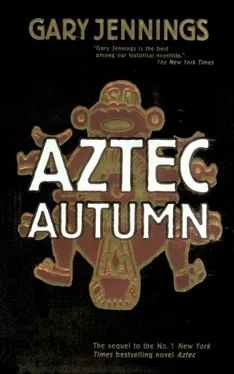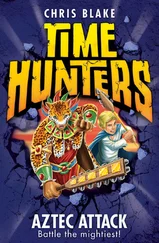Gary Jennings - Aztec Autumn
Здесь есть возможность читать онлайн «Gary Jennings - Aztec Autumn» весь текст электронной книги совершенно бесплатно (целиком полную версию без сокращений). В некоторых случаях можно слушать аудио, скачать через торрент в формате fb2 и присутствует краткое содержание. Жанр: Старинная литература, на английском языке. Описание произведения, (предисловие) а так же отзывы посетителей доступны на портале библиотеки ЛибКат.
- Название:Aztec Autumn
- Автор:
- Жанр:
- Год:неизвестен
- ISBN:нет данных
- Рейтинг книги:4 / 5. Голосов: 1
-
Избранное:Добавить в избранное
- Отзывы:
-
Ваша оценка:
- 80
- 1
- 2
- 3
- 4
- 5
Aztec Autumn: краткое содержание, описание и аннотация
Предлагаем к чтению аннотацию, описание, краткое содержание или предисловие (зависит от того, что написал сам автор книги «Aztec Autumn»). Если вы не нашли необходимую информацию о книге — напишите в комментариях, мы постараемся отыскать её.
Readers familiar with Mexican history will welcome the rich details of this vengeance drama; those new to it will be impressed by Jennings's exhaustive research.
Aztec Autumn — читать онлайн бесплатно полную книгу (весь текст) целиком
Ниже представлен текст книги, разбитый по страницам. Система сохранения места последней прочитанной страницы, позволяет с удобством читать онлайн бесплатно книгу «Aztec Autumn», без необходимости каждый раз заново искать на чём Вы остановились. Поставьте закладку, и сможете в любой момент перейти на страницу, на которой закончили чтение.
Интервал:
Закладка:
"That is true. Have you anything else to command, my lord?"
"Yes, one more thing. Tell the Purémpe women not to waste their granadas on the town's two stone buildings, the church and the palace. Granadas could not cause much damage there. Besides, I have a reason for wanting to do the taking of those two structures myself. Now go. Begin the preparations."
The initial assault on Tonalá went as I had planned it, except for one brief balk, which I myself should have foreseen and made provision against. I and Nochéztli, Uno and Dos, sat our mounts on a small hillock with a good view of the town, and watched as the Yaki warriors swarmed into the slave-quarter outskirts at first dawn, shrieking inhuman war cries and ferociously flailing their war clubs and three-pronged spears. As I had commanded, they made more noise than ruination, killing only (as I would later learn) a few slave men who started up from sleep and, bravely but foolhardily trying to defend their families, threw themselves deliberately in the path of the Yaki.
As I had expected, the Spanish soldiers came running—some galloping on horseback—from their garrison palace and their various posts, to converge at the scene of action. Some of them were still awkwardly putting on their armor as they came, but they all came armed. And, still doing as I had commanded, the Yaki melted away before them, withdrawing onto the open ground this side of the town. But they pranced backward as they fled, facing the soldiers, yelling defiance, waving their weapons menacingly. That brash display cost some of them their lives, because the Spaniards, though taken unawares and unprepared, were soldiers, after all. They formed lines, knelt, took careful aim with their arcabuces and discharged them accurately enough to bring down several of the Yaki before the rest ceased their posturing and turned and ran to safety at a distance. That left a clear field for my own arcabuz men, and we saw them all—there were ninety and four of them—rise up from their concealment, take their several aims and at a word from their commanding knight, all discharge their weapons simultaneously.
That was effective, indeed. A good number of the soldiers afoot went down, and a few others toppled from their saddles. Even at our distance, I could see the confused milling about of the astonished Spaniards who had survived that storm of lead. However, there now occurred the balk that I have mentioned. My arcabuz men had employed their weapons as efficiently as any Spanish soldiers could have done—but they had done so all together. And now, all together, they had to recharge those weapons. As I well knew, and should have taken into account, that process requires some time, even for the most adept and practiced man.
The Spaniards had discharged their arcabuces not all together, but sporadically, as targets and opportunities afforded, hence most of them had weapons still charged. While my own arcabuz men stood unarmed—ramming the pólvora and wads and lead balls down the thunder-sticks' tubes, priming the pans, rewinding the wheels' locks, cocking the cat's-paws—the Spaniards regained enough composure and discipline to resume their sporadic but deadly discharging. Many of my arcabuz men were struck, and almost all the others crouched low or flopped flat on the ground, in which positions their recharging of their weapons was further impeded and delayed.
I cursed aloud in several languages and barked at Nochéztli, "Send the Yaki in again!"
He made a sweeping gesture with his arm and the Yaki, who had been watching for that, swept anew past our line of now disconcerted arcabuz men. Having seen their fellows fall during the earlier foray, the Yaki went really vengefully this time, not even wasting their breath to shout war cries. More of them fell to the Spanish lead as they went, but there were still many of them to plunge in among the Spaniards, viciously stabbing and clubbing.
I was just about to give the order for us four mounted men to charge, with our Aztéca behind us, when Uno reached from his horse to clutch my shoulder and say, "Your pardon, John British, if I presume to give you a bit of advice."
"By Huitztli, man!" I snarled. "This is no time to—"
He overrode me, "Best I do it now, Cap'n, while I have life to speak and you to hear."
"Get on, then! Say it!"
"Me, I would not know one end of a harquebus from the other, but I have shipped along of His Majesty's marine soldiers a time or two, and seen them in action. What I mean, they do not all fire at once, as your men did. They form up in three ranks, parallel. The first rank fires, then falls back while the second rank aims. The second rank fires and falls back while the third rank aims. By the time the third rank has fired, the first has reloaded and is ready to fire again."
There were goose words in that speech, but I readily comprehended the sense of it, and said:
"I humbly ask your pardon, Señor Uno. Forgive my having snapped at you. The advice is sound—and welcome—and I will heed it ever after this day. I kiss the earth to that. Now, señores, Nochéztli..." I swept my sword arm to start the Aztéca running. "If you fall, fall forward!"
XXIX
The most memorable aspect of any battle—and, having now experienced many of them, I can say this with authority—is its dizzying commotion and confusion. But of this one, my first major engagement with the enemy, I do retain a few memories more distinct.
As we four mounted men pounded across the open ground and into the affray, only a few stray lead balls flew harmlessly past us, because the Spanish soldiers were very much occupied with the Yaki among them. Then, as we new assailants also closed with them, I vividly remember the sounds of that encounter—not so much the clashing of arms, but the clamor of voices. I and Nochéztli and all the Aztéca who followed us were uttering the traditional cries of various wild animals. But the Spaniards were shouting the name of their war santo— "¡Por Santiago!" —and, to my surprise, our own two white men, Uno and Dos, were apparently doing the same. They roared what sounded to me like this: "For Harry and Saint George!" though I had never, even in my Christian-schooling days, heard of any santos named Harry and George.
There were other noises from the distance, from inside the town—some sharp as thunderclaps, others mere muted thumps—the burstings of the clay-ball granadas being employed by our women warriors. Doubtless the Spanish officers would have liked to detach some of their men from the struggle here at the town's edge, and send them to deal with those inexplicable thunders. But they had no hope of doing that, because, right here, their men were by now outnumbered and fighting for their lives. Neither their fighting nor their lives lasted very long.
If there are such beings as Saints Harry and George, they lent their followers greater strength of arm than Santiago did to his. Uno and Dos, though unsteadied by saddles and stirrups, slashed left and right from atop their mounts, as tirelessly, mercilessly and killingly as did I and Nochéztli. We four struck at the soldiers' throats and faces, the only vulnerable places between their steel helmets and steel breastplates, and so did our Aztéca warriors wielding obsidian maquáhuime.
The Yaki warriors, however, did not have to be so precise in their aim. In these close quarters, they had dropped their unwieldy long spears and were almost indiscriminately swinging their ironwood war clubs. A blow to an opponent's head would dent his helmet deeply enough that his skull would cave in beneath it. A blow to an opponent's body would so dent his breastplate that he would either die of crushed bones and organs or—more agonizingly—suffocate, his chest unable to expand to breathe.
Читать дальшеИнтервал:
Закладка:
Похожие книги на «Aztec Autumn»
Представляем Вашему вниманию похожие книги на «Aztec Autumn» списком для выбора. Мы отобрали схожую по названию и смыслу литературу в надежде предоставить читателям больше вариантов отыскать новые, интересные, ещё непрочитанные произведения.
Обсуждение, отзывы о книге «Aztec Autumn» и просто собственные мнения читателей. Оставьте ваши комментарии, напишите, что Вы думаете о произведении, его смысле или главных героях. Укажите что конкретно понравилось, а что нет, и почему Вы так считаете.











